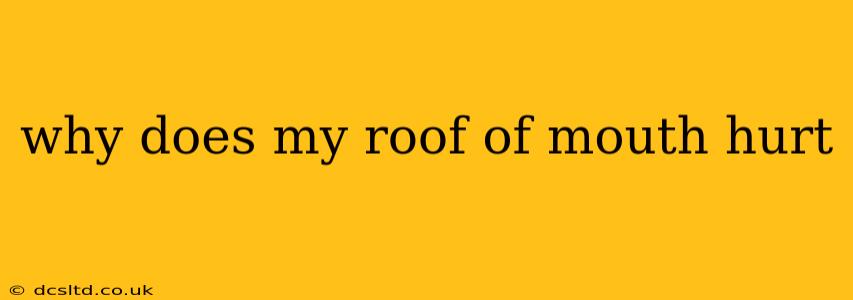A sore roof of the mouth, medically known as the palate, is a common ailment with a variety of potential causes. Understanding the underlying reason for your discomfort is crucial for effective treatment. This guide will explore the most frequent culprits, offering insights into diagnosis and management.
Common Causes of a Sore Roof of the Mouth
Several factors can contribute to palate pain. These range from minor irritations to more serious underlying medical conditions. Let's delve into the most prevalent reasons:
1. Minor Irritation and Injuries:
- Burns: Hot food or beverages are a frequent cause of palate burns. The burning sensation can range from mild discomfort to significant pain, depending on the temperature and duration of exposure.
- Cuts or Scrapes: Accidental injuries from sharp food items or dental work can cause cuts and scrapes on the roof of your mouth, leading to pain and discomfort.
- Blisters: These can develop from friction caused by ill-fitting dentures or braces, or even from repeatedly sucking on hard candies.
- Dry Mouth: A lack of saliva can lead to dryness and discomfort in the mouth, making the palate feel sore and irritated.
2. Infections:
- Oral Thrush (Candidiasis): This fungal infection is characterized by white patches or lesions on the palate and can cause significant pain and discomfort. It's more common in individuals with weakened immune systems, such as those undergoing chemotherapy or taking antibiotics.
- Viral Infections: Certain viral infections, like the common cold or flu, can cause inflammation and soreness in the mouth, including the palate.
- Herpes Simplex Virus (HSV): This virus can cause cold sores on the lips and sometimes also painful lesions on the palate.
3. Medical Conditions:
- Apthous Ulcers (Canker Sores): While these typically appear on the inner cheeks or lips, they can occasionally develop on the palate. These painful sores are often associated with stress, hormonal changes, or nutritional deficiencies.
- Gingivostomatitis: This is a common viral infection affecting the gums and mouth, often causing painful sores on the palate. It frequently affects children.
- Systemic Diseases: In rare cases, palate pain can be a symptom of more serious underlying medical conditions like autoimmune disorders or certain types of cancers.
4. Allergies:
- Food Allergies: Allergic reactions to certain foods can manifest as oral inflammation, including soreness on the palate.
What to Do if Your Roof of Mouth Hurts
The best course of action depends on the underlying cause. For minor irritations like burns, applying a cold compress or rinsing with saltwater can provide relief. If the pain is severe or persistent, it is crucial to consult a doctor or dentist.
How Long Does a Sore Roof of the Mouth Last?
The duration of pain depends on the cause. Minor irritations may resolve within a few days, while infections or more serious conditions may require longer treatment.
When Should I See a Doctor or Dentist?
Seek professional medical attention if:
- The pain is severe or persistent.
- You experience fever, swelling, or difficulty swallowing.
- You notice white patches or lesions on your palate.
- The pain is accompanied by other symptoms, such as fatigue or weight loss.
Can a Sore Roof of the Mouth Be Prevented?
While not all causes are preventable, you can reduce your risk by:
- Avoiding hot foods and beverages.
- Practicing good oral hygiene.
- Treating underlying medical conditions.
- Choosing well-fitting dentures or braces.
This information is for general knowledge and does not constitute medical advice. Always consult a healthcare professional for diagnosis and treatment of any medical condition. A proper examination is essential to determine the specific cause of your palate pain and develop an effective treatment plan.
